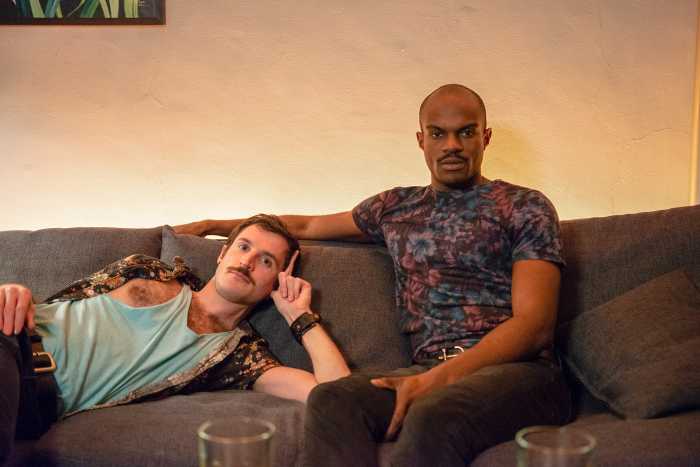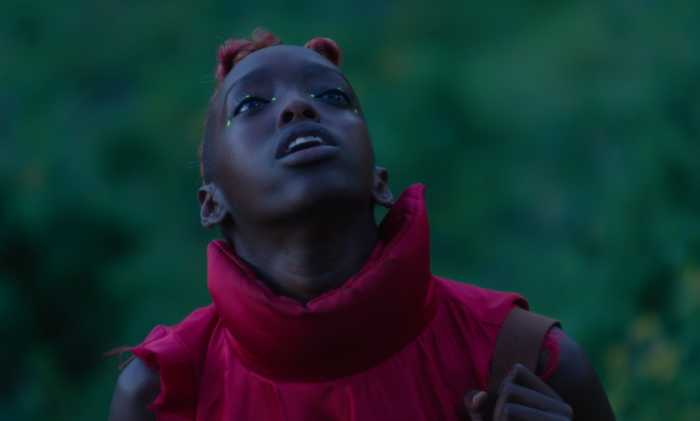At this year’s Tribeca Film Festival, there is an entire shorts programs dedicated to LGBTQ films. But there are also several queer-themed shorts screening in other programs. Here is a rundown of 11 of this year’s festival’s queer shorts.
“Angelo”
“Angelo” is writer/director Alex Plumb’s fantastic short about the title character (Paolo Vargas), who finds beauty as a way of escaping from his harsh reality as a shoeshine boy in Bolivia. Feeling unseen, he uses his invisibility as a superpower to experience a freedom from sexual, financial, and racial oppression. “Angelo” features marvelous visuals, from indelible faces and bodies to urban landscapes that provide a sense of reality and context for Angelo’s life. Plumb’s shrewd editing of this portrait and Vargas’ poignant voiceover make this film shine.
Blonde Night
The excellent Canadian two-hander, “Blonde Night,” has Victor (Patrick Dorneval) meeting Jessy (Dany Boudreault) and helping him out by giving him some money and a belt to keep his pants up. Jessy appreciates Victor’s largess, and takes him to a nightclub, where they drink and dance before things get a bit more intimate. Jessy is sensitive to Victor’s needs, which is why the film is so engaging; each man expresses compassion and kindness towards the other. A scene where Victor runs his hands through Jessy’s blonde hair is sensual and moving — a true expression of desire and pleasure.
“Burrow”
“Burrow” has John (Christian Coulson) eking out life in cold isolation for six years following some catastrophic event that has decimated the population. When he discovers Arian (Marc Crousillat), he takes him in and helps him prepare to search for his parents in exchange for some assistance hunting for food. But as the men get closer, dancing by a fire at night, or sharing a bed, a tension grows between them. There are several possible outcomes — will the men stay together? Will they fall in love? Or will they separate? And will either of them die? Writer/director Leaf Lieber’s flinty, stylish short about loneliness and longing teases out the possibilities. “Burrow” will likely draw comparisons to that gay episode of “The Last of Us,” and it is compelling, if almost too short. Coulson and Crousillat make an attractive couple and have a real chemistry together. More scenes of them together would have further enhanced the already emotional climax.
“Daddy Issues”
“Daddy Issues” is an amusing tale of a sex worker (writer/codirector Matt Campanella) whose encounter with a client gets very intense. Campanella frames the scenes well and delivers a fun turn as a young leather-clad gay man who is trying to work out the best approach to his cringy situation. Even if audiences see what is coming, this short will generate a smile in its five minutes.
“Ecstasy”
“Ecstasy” is an arty, eight-minute, three-part short that feels like a series of trailers for a more comprehensive horror film. A group of nuns wanders around a sacred space, feeling ominous forces, writhing in ecstasy, and experiencing forbidden desires as eerie music plays. It is based on Saint Teresa de Avila’s writing, but the non-narrative approach does not provide much clarity despite some appealing images.
“A Fox in the Night”
“A Fox in the Night” depicts the chance encounter between Lewis (writer/director Keeran Anwar Blessie) and Daniel (Korey Ryan), a drug dealer in a London flat. The two men navigate an unspoken attraction that empowers both of them in different ways. Shot with a handheld camera to convey a sense of urgency and uneasiness, this disarming film is sure to charm.
“Heartbeat”
“Heartbeat” has four friends — Vanja (Rabea Lüthi), Alex (Martha Benedict), Evie (Anouk Barakat), and Liz (Lou Haltinner) — camping. There is some unresolved tension, some of it sexual, between Vanja and Alex, which comes to a head when they go off alone together. Director Michèle Flury, who co-wrote the script with Benedict, shows how things play out, with the help of a frog Evie and Liz find in this slice of life short.
“In Passing”
“In Passing” is writer/director Hillia Aho’s delicate short about Rey (Fedra Ramirez Olivares), who is overtired from lack of sleep and working too many shifts at her restaurant gig. She worries about money while her more carefree girlfriend, Elle (Kaileela Hobby), a painter, struggles with a project. As both women’s nerves become fried, they behave in possibly self-destructive way as they try to find a way to be in peace, alone or together. This is a slight but artfully made film.
“Let Liv”
“Let Liv” is a strong short about the title character (writer Olivia Levine) who attends an AA meeting on her fifth date with Marty (Rosaline Elbay). Liv’s impression at the meeting is positive, until it isn’t, and Judy (Christine Taylor), a woman from her past, turns up and causes Liv to become abrasive. Director Erica Rose captures the emotions here well in this heartfelt drama.
“Mars”
“Mars” is a sweet short about a trans individual, Charlie (Yasmin Finney), trying to find her place in the world. She is most herself in the company of her friend Maisie (Leah Choudhry), but keeps it a secret that she attends a support group for trans youth — in part because she does not feel comfortable there. But when Charlie finds a sense of joy, she also finds a sense of belonging. This is an enjoyable short, and Finney gives a luminous performance.
“Thaw”
“Thaw” is a slow short about two friends, Smith (Caitlin Cobb-Vialet) and Huck (Jack Petersen), arriving in a cabin in the woods during winter. Huck finds a pair of earrings in a drawer and models them. Later, Smith sees Huck in a dress and encourages him to wear it during dinner. Smith, herself, soon sports a man’s jacket. She chops wood, he bakes bread. “Thaw” is deliberately paced as it considers gender roles and identities, but it does not say much new other than giving its characters the freedom to dress as they desire — which may be enough.
































